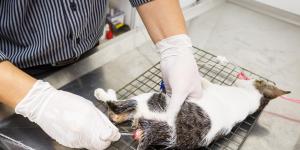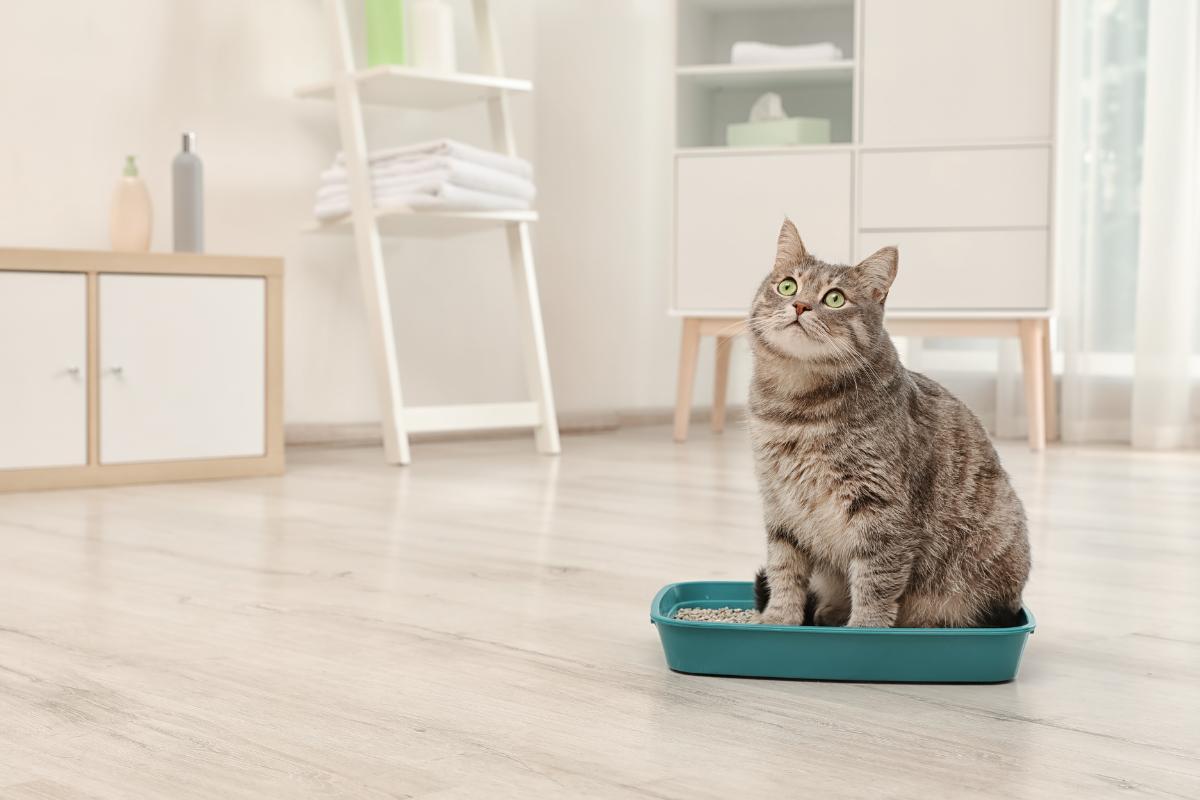How Can I Help My Constipated Cat?

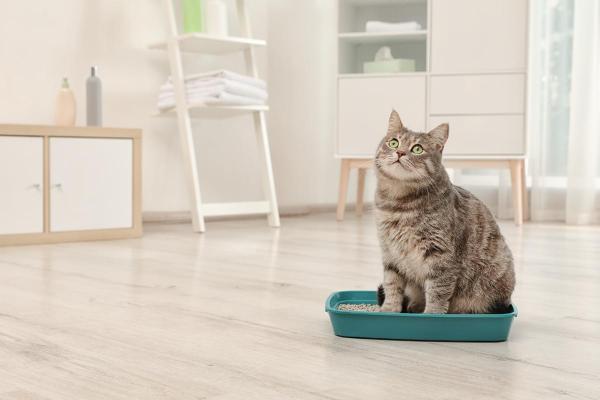

See files for Cats
While cats typically have bowel movements every 12-24 hours, a lack of poop can signal a potential health issue. When waste products aren't eliminated regularly, they can harden and become difficult to pass, causing constipation. This can be painful for your cat and, if left untreated, can lead to a more serious condition.
This article from AnimalWised will delve into the main causes of constipation in cats, providing practical tips on what to do and discussing various treatment options tailored to each case.
Stress
The stress or fear that cats experience in situations that trigger the release of adrenaline and cortisol is a primary reason why a cat might have difficulty defecating. Cats are highly sensitive to environmental changes that might seem insignificant to humans but can be profoundly stressful for them.
Common stress-inducing situations for cats include:
- Car trips
- Visits from acquaintances or family
- The arrival of a new household member or pet
- Home renovations
- Moving to a new home
- Loud noises
- Changes in location
- Rearrangement or replacement of furniture
When cats are stressed or frightened, their intestinal transit can slow down, leading to overly dehydrated feces that are difficult to expel. Additionally, the release of stress hormones like cortisol can further slow down the digestive system, making it harder for food to move through the intestines.
If a cat feels unsafe or stressed about their litter box location, they might avoid using it altogether, which can lead to constipation as they hold in their waste.
What to do?
The first step is to identify what is causing your cat's stress and, if possible, eliminate or minimize the stressor. Ensure your cat has a quiet, comfortable place to retreat and feel secure. This can be a high perch, a cozy bed, or even a cardboard box.
If your cat hasn’t defecated in more than 48 hours, is straining while trying to go, or seems lethargic, consult your veterinarian immediately. They can rule out any underlying medical conditions and provide appropriate treatment.
Learn to recognize the most common signs of stress in cats in this other article.
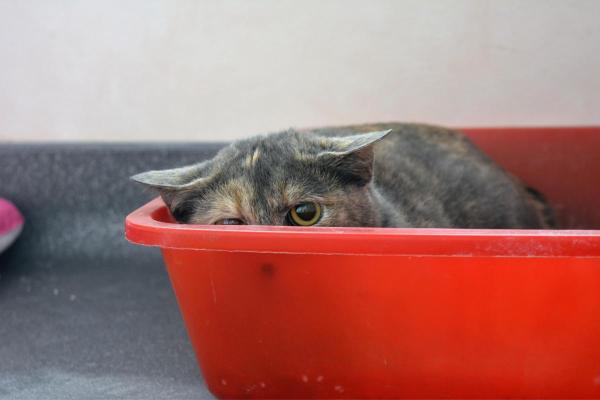
Colon obstruction
Colon obstruction can prevent cats from defecating. When there is a narrowing (stenosis) or an obstruction in the colon, it restricts the space available for feces to pass through, causing them to accumulate. As a result, the cat cannot defecate because the feces cannot reach the rectum and anus for expulsion. This blockage can be partial or complete.
The most common symptoms of colon obstruction, in addition to constipation, are:
- Vomiting
- Loss of appetite
- Lethargy
- Abdominal pain (cat may appear hunched or cry out when touched)
- Straining to defecate without producing stool
- Dehydration
What to do?
Remember, early diagnosis and treatment are crucial. If you notice your kitten straining to defecate, passing small amounts of stool, or not defecating at all, consult your veterinarian immediately. They can determine the best course of action for your kitten's specific situation.
If a foreign object like a toy or bone is causing the blockage, surgery might be needed for safe removal.
Be sure to read this other article if you notice blood in your cat's stool.
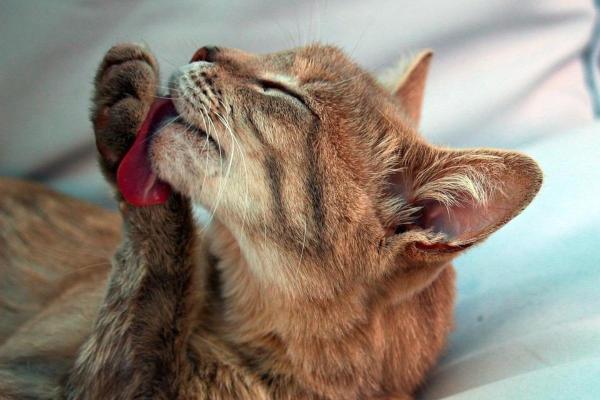
Hormonal or metabolic disorders
While constipation is a common complaint in cats, it can also be a clue to underlying hormonal or metabolic disorders.
On the one hand, hormonal disorders are imbalances in hormones produced by the cat's body. Hormones play a role in many bodily functions, including digestion. If there's a hormonal problem, it can disrupt the digestive system and lead to constipation.
On the other hand, metabolic disorders are conditions that affect how the body processes nutrients and energy. Dehydration, a common consequence of some metabolic disorders, can make stool harder and lead to constipation.
It's important to note that these are just two of many potential causes of constipation. Don't jump to conclusions! However, if you notice any of the following additional signs alongside constipation, it's best to consult your veterinarian:
- Changes in appetite
- Weight fluctuations
- Increased thirst or urination
- Lethargy or excessive energy
- Vomiting
- Diarrhea
- Pale gums or dehydration
- Bad breath
- Difficulty breathing
What to do?
If you notice any of these signs alongside constipation, consult your veterinarian immediately. They can perform a thorough examination, including blood tests, to diagnose the underlying cause.
In the case of hormonal disorders, your vet might prescribe medications to regulate hormone levels. Examples include thyroid medication for hyperthyroidism or insulin for diabetes.
In the case of metabolic disorders, dehydration is a common concern in metabolic disorders. Fluid therapy, either subcutaneously or intravenously, may be necessary to rehydrate your cat.
Finally, it is crucial to remember that maintaining a healthy weight is important for managing both hormonal and metabolic disorders.
learn to recognize the first signs of hyperthyroidism in cats by reading this other article.
Neuromuscular disorder
If your cat is having trouble pooping, it could be due to a neuromuscular disorder caused by trauma or nerve issues. Neuromuscular disorders affect the communication between nerves and muscles. This can disrupt the normal functioning of the digestive system, including the muscles responsible for moving stool through the intestines.
For example, an injury to the lower back can damage the nerves needed for proper defecation, making it difficult or impossible for your cat to poop. Problems with nerves like the pelvic or hypogastric nerve can interfere with the defecation reflex.Additionally, conditions like dysautonomia can cause nerve dysfunction, leading to issues with the muscles involved in defecation. Dysautonomia affects the autonomic nervous system and leads to degeneration of its neurons, although the exact cause is unknown.
In some neuromuscular disorders, the muscles in the intestines may lose tone, making it harder for them to push stool forward.
What to do
Early diagnosis and treatment are essential for managing neuromuscular disorders effectively and improving your cat's well-being. Treatment for neuromuscular disorders varies depending on the specific problem. It can include a combination of medications, physical therapy, dietary changes and supplements.
Surgery might be considered for specific conditions, such as correcting a herniated disc or removing a tumor pressing on nerves. However, it's not always necessary.
Shaking is a common indicator of a nerve issue in cats. Read the following article to learn how to identify this condition and what steps to take next.
Megacolon
Megacolon is another common reason of constipation in cats. In a healthy cat, the colon absorbs water from waste material, forming stool. The colon muscles then contract and relax, pushing stool towards the rectum for elimination. Megacolon is a condition where the colon becomes stretched and weakened.
This weakening can be caused by various factors like neuromuscular disorders or pelvic or spinal injuries. However, in 62% of cases, megacolon in cats has no known cause.
Signs that your cat may have megacolon, along with constipation, include vomiting, loss of appetite, excessive drooling (ptyalism), dehydration, feeling a hard mass in the abdomen, and electrolyte imbalances.
To make matters worse, waste material can build up and harden in the colon, further worsening the constipation.
What to do?
Treatment for feline megacolon focuses on increasing water content in the diet through wet food, soups, or cat milk, and ensuring access to fresh water or using flowing water sources to promote drinking.
Additionally, insoluble fibers like Psyllium can be used to increase stool water content and aid in defecation, but they should be used cautiously in early constipation stages to avoid harming the dilated colon. Laxatives such as lactulose or PEG 3350 may be added if dietary changes alone are insufficient. Bisacodyl can stimulate mucosal secretion and colon contractions.
Enemas are also employed, sometimes followed by manual extraction of feces in severe cases under general anesthesia and with antibiotics to prevent infection.
In recurrent or severe cases of megacolon, surgery may be necessary. A subtotal colectomy, removing 85-95% of the colon, is often performed, with a generally favorable prognosis.
Learn more about this megacolon in cats, including its causes and treatment options, in the following article.
How to prevent constipation in cats?
Here are some general things you can do to help prevent constipation in your feline friend:
- Increase fiber in your cat's diet. Fiber helps soften stool and promotes regular bowel movements. Consider adding a high-fiber dry food or canned food to their diet, or consult your vet about fiber supplements.
- Make sure your cat has access to fresh, clean water at all times. Encourage them to drink more by using a water fountain or placing multiple water bowls around the house. Dehydration can harden stool and contribute to constipation.
- Limit sugary treats and processed foods, as these can disrupt digestion and contribute to constipation.
- Maintain a clean litter box. Cats are naturally fastidious and may avoid using a dirty litter box, leading to constipation. Scoop waste daily and completely change the litter regularly. Consider having multiple litter boxes for your cat, especially in multi-cat households. This can reduce stress and competition for bathroom space.
- Regular exercise can help stimulate your cat's digestive system and prevent constipation. Encourage playtime with interactive toys or catnip to get them moving.
Finally, always schedule regular checkups with your veterinarian. Early detection and treatment of underlying health conditions that can cause constipation are crucial.
This article is purely informative. AnimalWised does not have the authority to prescribe any veterinary treatment or create a diagnosis. We invite you to take your pet to the veterinarian if they are suffering from any condition or pain.
If you want to read similar articles to How Can I Help My Constipated Cat?, we recommend you visit our Intestinal problems category.
- García, L. (2022). Mecagolon cats - Causes, symptoms and treatment . Available at: https://www.expertoanimal.com/megacolon-en-gatos-causas-sintomas-y-tratamiento-25862.html




